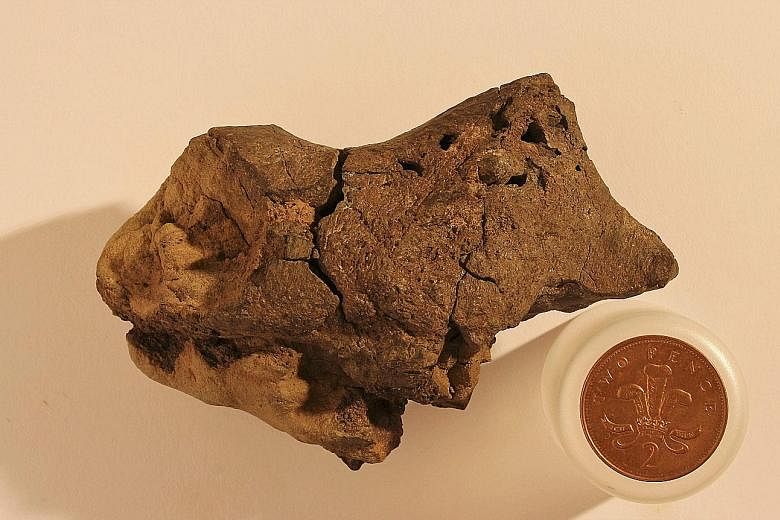Rare dinosaur brain fossil found in England
Soft tissues like hearts and muscles rarely last long enough to become fossilised. However, researchers in Britain recently identified a rare fossilised brain from a 133 million-year-old dinosaur in Sussex, England.
The brain probably belonged to a close relative of the plant-eating iguanodon, and might be the first example of a natural "pickling" of the brain under acidic conditions, followed by mineral hardening.
The fossil, discovered in 2004 in the town of Bexhill, was only recently identified as part of a brain. The work will be published in an upcoming Special Publication of the Geological Society of London.
Researchers from the University of Oxford and University of Western Australia worked together to visualise very small features of the fossil brain through high-resolution images, revealing its layered structure and tiny blood vessels. The structure is remarkably similar to the brains of birds and crocodiles, and probably functioned in similar ways.
Dr David Norman of Cambridge University, a collaborator, said in a media statement: "Brain tissues are incredibly fragile and it is quite incredible that the animal died in circumstances that uniquely led to their preservation... What we think happened is that this particular dinosaur died in or near a body of stagnant water, and its head ended up partially buried in the sediment at the bottom. Since the water had so little oxygen and was so acidic, the soft tissues of the brain were likely preserved and cast before the rest of its body was buried in the sediment."
Peanut skin extract boosts benefits of milk chocs
Dark chocolate can be a source of antioxidants, but many people dislike its bitter flavour. The taste of milk chocolate is more appealing, but it does not have the same beneficial properties.
Researchers at North Carolina State University in the United States have now found a way to make milk chocolate as nutritious as dark chocolate without affecting its taste. Their study was published in the Journal Of Food Science last month.
They extracted phenolic compounds from peanut skins, mixed them with maltodextrin powder and incorporated the extract into the milk chocolate. Maltodextrin is a common food additive that helps thicken the mix.
Eighty people who tried samples of milk chocolate with and without the peanut skin extract liked both equally well. The test also showed that milk chocolate could be fortified with antioxidants in the extract up to the level of antioxidants in dark chocolate.
Consumers could not detect the presence of the extract. Peanut skins are a waste product of the peanut industry and the authors said including these extracts will add value to the discarded skins.
Said lead author Lisa Dean: "If applied to commercial products, peanut skin extracts would allow consumers to enjoy mild-tasting products and have exposure to compounds that have proven health benefits."
The researchers are now investigating whether the fortified chocolate will pose a problem to those with an allergy to peanuts.
Top-level referees better at spotting fouls
Top-level football referees have enhanced visual perception and are better at spotting foul play and issuing the correct disciplinary action than lower-level referees, according to researchers from Belgium and Britain.
In the study, published in the journal Cognitive Research earlier this year, 39 referees from top and lower leagues in Belgium watched staged videos of fouls being committed from a referee's point of view on the pitch. Eye-tracking technology was used to assess the referees' visual-search behaviour - what their eyes were fixated on, and for how long.
Professor Werner Helsen from the University of Leuven in Belgium, a co-author of the study, said in a statement: "When watching open-play fouls being committed, elite referees spend more time fixating on the body part involved in the foul than other areas, suggesting that they are focusing on and interpreting the most crucial information."
The video clips used in the study featured competitive footballers who acted out different scenarios, including fouls in open play and from corner kicks. The action was filmed from a distance of about 10m to mimic the real-life proximity of a referee.
The elite referees in the test made the correct decision with an accuracy of 61 per cent, compared with 45 per cent among lower-level referees.
Prof Helsen said: "We can speculate from our results that the level of experience in elite referees is translated into long-term memory which allows their visual-search behaviour to be driven by acquired knowledge. Sub-elite referees, on the other hand, have less experience and seem to apply a more random control of visual fixation."
Although this may seem obvious to the layman, the study has a purpose. Co-author Jochim Spitz said: "Understanding what it is exactly that makes elite referees able to make better decisions than lower-level referees could help devise training programmes specifically aimed at improving visual-search behaviour."
Lin Yangchen


